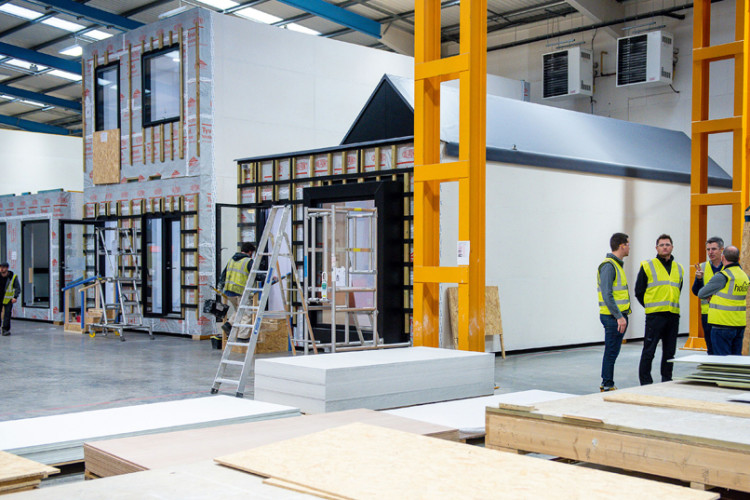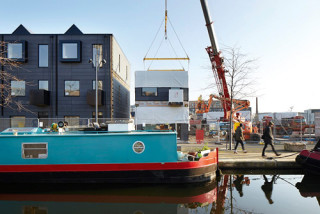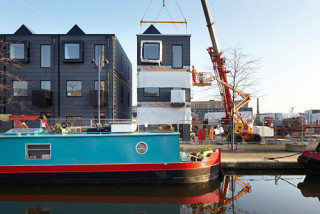When any construction firm first ventures into a foreign country it is always handy for it to have £30m of the host government’s money in its back pocket.
This is the happy position of Sekisui House, a large Japanese builder which, though little known in the UK, is a big deal around the Pacific rim and could be involved in building at least 2,000 modular homes a year here.
Sekisui House is entering the UK as part of the government’s drive for more modular, off-site construction in the housing sector. Indeed, Homes England’s chairman Sir Edward Lister has boasted that the Japanese incomer will “disrupt the housing market”, through an £89.3m three-way deal between it, Homes England and developer Urban Splash.
The deal is made up of £26.8m of debt funding and £3.1m of equity from Homes England, a £21.8m investment by Sekisui House and £37.5m from Urban Splash. There is also £2.5m from entrepreneur Noel McKee, the man behind the WeBuyAnyCar website.
Sir Edward said: “When Homes England launched last year, we said we’d disrupt the housing market to increase the pace of construction. By helping bring one of the world’s largest and most innovative housebuilders to UK shores, we’re putting our money where our mouth is.
“By creating a more diverse landscape – where smaller builders such as Urban Splash get a stronger foothold – we’re rebuilding the building industry; driving up quality and improving consumer choice,” he added.
Sekisui House will not be building in the UK in its own right, however - this is more a matter of Urban Splash accessing its Japanese partner’s designs and expertise in getting modular housing built in large volumes so that it can try to do the same here.
A statement supplied by Sekisui House said it had decided to enter the UK market because “our technology and know-how can help resolve a pressing social issue - lack of houses, [the] population of the UK keeps growing steadily, we assume demand [for] houses continues in the future”.
The company also says that it sees growth potential for modular housing in the UK because it “can provide short term construction and stable high quality [and] matches with the situation above”, but it has no plans for any other involvement at present in the UK construction market.
Urban Splash says the money in the deal will be used build modular homes and for some research and development.
Its initial plans are to have some modular construction – both houses and apartments – at existing developments, with 160 at Manchester’s New Islington, 340 at Wirral Waters and 1,000 at Milton Keynes’ Campbell Park.
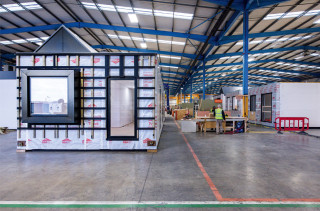
A spokeswoman says: “We can scale up fast and expect to do 2,000 modular homes a year over at least the next 10 years.
“The homes will be built by us from components made in our factory in Alfreton, though the apartments use components it cannot provide and those have been outsourced to a company in Bilbao.”
Urban Splash’s modular homes will be partly customisable by purchasers, who can make their requests and have these sent to the factory and the relevant components provided.
Sekisui House is not setting up any manufacturing site here but it will allow Urban Splash to use its designs and expertise and its 6,500m2 research and development facility in Japan. Urban Splash will then be able to adapt designs as needed.
The spokeswoman adds: “The disruption of the market is the speed at which we can build these to meet the government’s target.”
So, a major foreign company enters the market with considerable expertise in an emerging field and will offer expertise in the UK but not itself compete with anyone. Who could object?
The National Federation of Builders, for one. Its head of housing and planning policy, Rico Wojtulewicz, says: “With the planning process as the main challenge for developers and disruptors, it is incredibly frustrating to see the government prioritise a partnership with a large foreign company over tackling something that the UK house building sector has asked the government to reform since 2014.
“Homes England have done a great job de-risking planning and project finance because it recognises how long it takes to get a shovel in the ground. Yet those solutions and experiences have not made the government any wiser, since it did the bare minimum for SMEs and continues to fail a sector training four in five construction apprentices, making up the majority of rural employers and sustaining regional supply chains.”
Urban Splash chair Tom Bloxham says Sekisui House had the best expertise it could find when seeking a partner: “Having looked far and wide we chose Sekisui House from Japan because of the company’s unrivalled global experience in modular construction and shared values and philosophy that we are making homes not units, and a joint belief in the need for a green future”
Housing minister Kit Malthouse says: “Sekisui House bring with them a proven track record in harnessing the modern methods of construction that are transforming home building.”
Although off-site construction has long been touted as the future of UK house-building, there is still some question as to how willing the public will be to buy modular homes, and lenders to advance mortgages.
Memories of post-war era prefabs may be fading, but as with anything else novel there will be enthusiastic ‘early adopters’ while others – maybe the majority – will be wary of the unfamiliar.
Urban Splash’s spokeswoman admits: “In the early days there were some people with concerns drawing parallels with prefabs, and mortgage lenders were uncertain, but the product is now better known.”
The Council of Mortgage Lenders says individual lenders will make their own risk assessments and decide whether or not to lend on any particular type of homes.
It says: “Generally, lenders will want to be certain of a number of factors affecting a property’s value before they can lend on modular housing including: the longevity of the construction, the whole life and repair costs, its adaptability, whether it can get standard insurance, and whether it meets acceptable quality standards and has a good warranty covering it.”

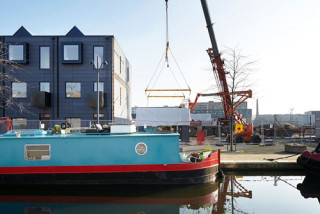
Banking industry body UK Finance and several lenders sit on a working group sponsored by the government which is looking at how modern methods of construction can be made more acceptable to mortgage lenders and insurers. It is due to publish proposals later in the year.
The government has become convinced that its target of 300,000 new homes a year by the middle of the next decade cannot be delivered from the house-building industry’s normal capacity and that to get there smaller firms must be encouraged to build and modular construction must be used to get homes up more rapidly.
But is Whitehall doing enough? A Royal Institution of Chartered Surveyors (RICS) policy paper on Modern Methods of Construction (MMC) published in April said the house-building industry was “characterised by low productivity, variable quality, output lagging behind target, and slim margins for builders”.
It said off-site manufacture and modern methods of construction such as modular “represents an opportunity to address many of these issues in addition to increasing capacity and investment in the industry”.
This would supplement what was already there and while “not a panacea that will resolve all the problems in the sector, once fully embedded, will go some way to improving our capacity to meet need”, says RICS.
To get from here to there, RICS provided a lengthy list of recommendations to government. These included:
• a stronger presumption in favour of MMC in public infrastructure schemes;
• financial incentives for local authorities and housing associations to use MMC;
• promote guarantees, warranties and accreditations for MMC at a similar level of lender and consumer confidence as for standard construction;
• improve workforce skills to work with MMC;
• explore using incentives to open MMC factories in areas of high unemployment;
• update the Building Regulations to better recognise MMC.
Excited as Homes England and Urban Splash are by establishing their partnership with Sekisui House, and despite the latter’s recognised expertise, it looks like there is much else for the government to do to move off-site manufacturing and modular homes from a curiosity to the mainstream, and so also give itself a chance of meeting its target.
Sekisui House
Sekisui House was founded in 1960 and has so far built almost two-and-a-half million houses, mainly in Japan but also in China, Singapore, Australia and the USA.
The company employs 24,857 people and operates five modular construction factories in Japan, plus its research and development laboratory in Kyoto.
The company says it uses factory production to build steel-framed and wooden unit housing that emphasises “comfort, safety and environmental friendliness precisely in accordance with design specifications”.
Sekisui House’s Australian operation describes the Kyoto facility as “a specialised experience studio which analyses how people live in their homes, their movements and behavioural patterns”.
It adds: “It’s this type of research that has informed the thinking behind every detail in our homes, from placement of handrails, door handles and light switches, through to considerations on heights for steps or minimum width of hallways. The insights we gain from our research studios are then communicated to the design team who work to embed functionality into an aesthetically thoughtful design.”
Another area in which Sekisui House says it leads is sustainability, describing itself as “the global leader in the construction of net-zero-energy homes” with more than 44,000 of these built since the product was launched in 2013.
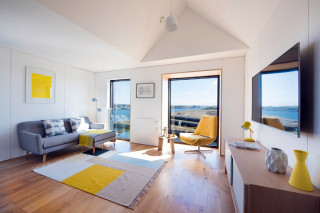
This article was first published in the June 2019 issue of The Construction Index magazine
UK readers can have their own copy of the magazine, in real paper, posted through their letterbox each month by taking out an annual subscription for just £50 a year. Click for details.
Got a story? Email news@theconstructionindex.co.uk

